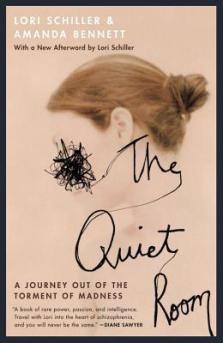The Quiet Room by Lori Schiller, which was first published in 1994, was February’s choice for my Mad Woman’s Book Club. It sounded incredibly intriguing to me, and created quite a lot of buzz with other members. Schiller’s account of her schizo-affective disorder, which contains elements of both schizophrenia and manic depression, has been written with the guidance of Amanda Bennett, a Wall Street journalist.
Schiller’s diagnosis was not reached until she was twenty-three years old, and a graduate of Tufts University in Massachusetts. Prior to this, she is in an almost constant state of turmoil; she wakes up hearing voices whilst at a summer camp when she is seventeen, and they remain with her. To her strength, she does not let anything interfere with her education, but soon after she has finished her degree and is looking at beginning a career in a shared apartment in New York City that she is immersed within the mental care system. ‘Along the way,’ writes Schiller, ‘I have lost many things: the career I might have pursued, the husband I might have married, the children I might have had. During the years when my friends were marrying, having their babies and moving into the houses I once dreamed of living in, I have been behind locked doors, battling the Voices who took over my life without even asking my permission.’ Schiller’s description of these voices is often chilling.
We are given Schiller’s opinion of events throughout, as well as those of her parents, brothers, friends, and psychiatrist – pretty much everyone who experienced the worst of it with her. This use of multiple perspectives helps to fill those memory gaps which Schiller has about some of her darkest points, and gives a fuller picture of the disease and its effects. The position of retrospect which Schiller, of course, has to take, is fascinating to draw out here. It comes in a sort of double dose, I suppose; the book was written with several years of distance, but reading it in the 21st century allows one to see just how much things have altered with regard to treatments being tailored to individuals rather than the mass. The same can be said for the diagnostic process. Those I know who have suffered with mental illness suggest that diagnoses are not made in such a trial-and-error manner as they appear to have been in Schiller’s case.
At the beginning of The Quiet Room, I felt quite distanced and wasn’t overly engaged with it. It changed dramatically at around the fifty page point for me though, after which I could barely put it down. Schiller’s case is harrowing; it takes an awfully long time for a diagnosis to be reached, and many treatments fail to work for her, either exacerbating her symptoms or making her withdraw further into herself. One feels an awful lot of empathy for her.
The Quiet Room presents enlightening and scary details about firsthand drug use, which Schiller turns to when the more traditional treatments fail to work for her. It is certainly a no-holds-barred memoir. Throughout her ordeal, Schiller shows great bravery; when released after one of her earliest hospitalisations, she applies for a job in a psychiatric hospital. The reading process involved here is intense, and rather draining at times. It is difficult to really enjoy a book of this sort, but it is not difficult to admire the writer and her courage in making such a horrific story publicly available. The Quiet Room is honest and powerful, and a must-read if you are at all interested in mental illness and its effects.
Purchase from The Book Depository
Advertisements Share this:




